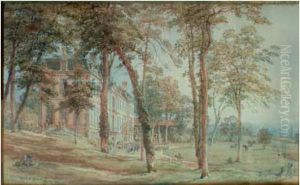Laurent Atthalin Paintings
Laurent Atthalin was a French artist born in 1808 in Barr, Alsace, then part of France. He was not only a painter but also a politician, showcasing a rare combination of talents that allowed him to navigate both the artistic and political landscapes of 19th-century France. Atthalin's life and career were deeply influenced by the historical and cultural shifts of his time, particularly the tumultuous events that swept through France and Europe during his lifetime, including the revolutions of 1848 and the Franco-Prussian War of 1870-1871. These events, coupled with the shifting allegiances of Alsace between France and Germany, played a significant role in shaping his artistic and political endeavors.
Atthalin's artistic talent was evident from a young age, and he pursued his passion for art alongside his political ambitions. He was known for his landscapes and portraits, capturing the beauty of the French and Alsatian countryside as well as the intricacies of the human face. His work was characterized by a keen attention to detail, a vibrant color palette, and a deep appreciation for the natural world. Atthalin's art was a reflection of his love for his homeland, and through his paintings, he sought to capture the essence of Alsace, with its unique blend of French and German influences.
In addition to his work as an artist, Atthalin was also deeply involved in politics. He served in various administrative and political roles, including as a deputy in the French National Assembly. His dual career allowed him to influence both the cultural and political landscapes of France, advocating for policies that supported the arts and cultural heritage while also navigating the complex political challenges of his time.
Atthalin's contributions to art and politics were recognized during his lifetime, and his legacy continues to be celebrated in Alsace and beyond. His paintings remain highly valued by collectors and art historians, serving as a testament to his skill and passion. Laurent Atthalin died in 1884, leaving behind a rich body of work that continues to inspire admiration and respect. His life and career exemplify the profound impact that one individual can have on both the arts and the political sphere, making him a notable figure in the history of 19th-century France.
